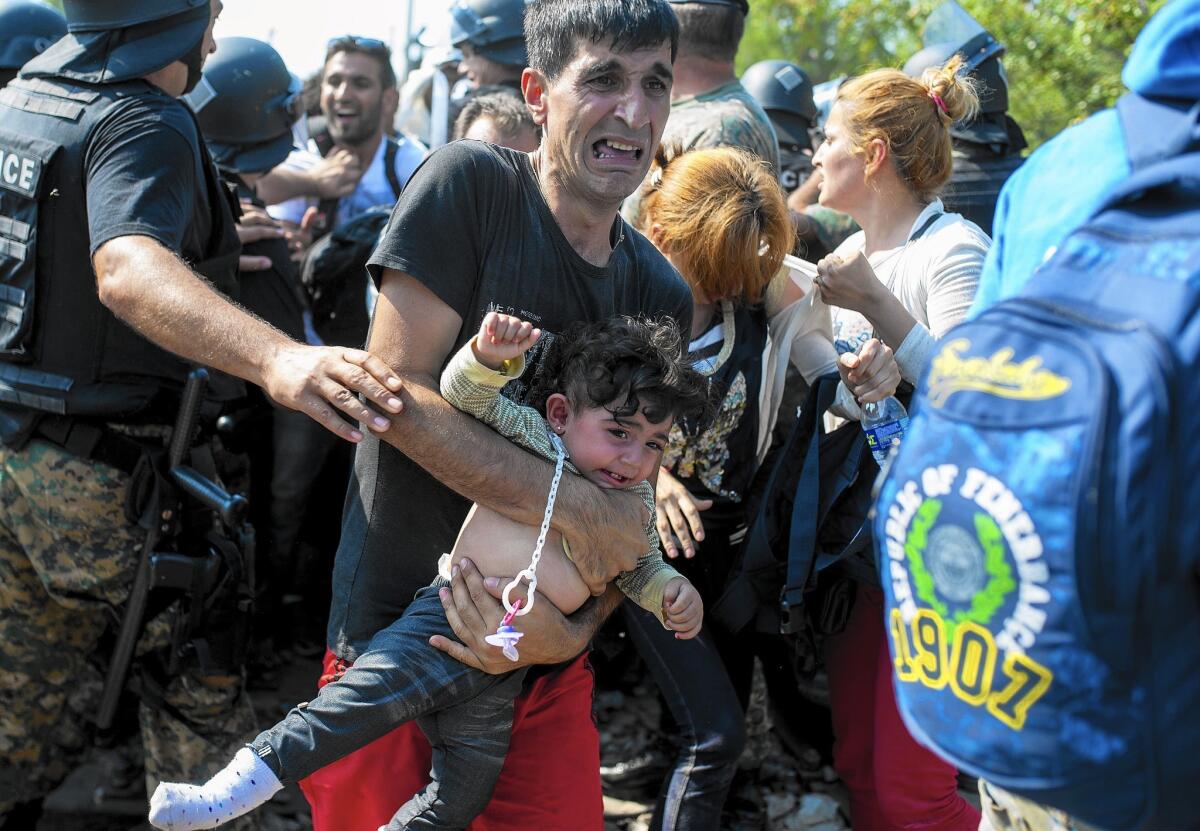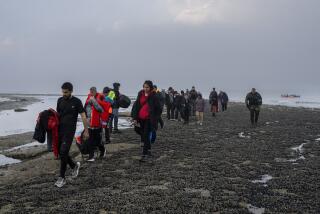Macedonia border camp helps send migrants on their way

Reporting from Gevgelija, Macedonia — The camp, perched on a dusty patch of ground amid agricultural fields, has only one nearby tap for running water. There’s no place to buy food. There’s not enough shelter from the summer sun as the temperature nears 90 degrees. The cries of hot, tired children are a constant soundtrack.
But it’s a place to rest for now for thousands of migrants, at least until the Macedonian government can speed them on their way.
After clashes last week between truncheon-wielding police and migrants, authorities here have given up trying to stop people fleeing violence in their homelands from crossing Macedonia on the way to wealthy European Union countries. Instead they are working to send migrants on to Serbia as quickly as possible.
In the meantime, officials have created this camp just inside the country where they are working to register migrants and put them onto trains and buses headed north, commissioning extra buses to avoid a backlog.
Authorities set up the site to stop refugees from congregating at the train station here in the border town of Gevgelija, where thousands of people waiting for transportation in recent months were sleeping on the platform, without adequate sanitation facilities or shelter. But the new camp has left the United Nations’ refugee agency scrambling to provide adequate facilities for what it says are as many as 3,000 new arrivals each day.
Alexandra Krause, senior protection officer for agency, said Wednesday that the situation is an improvement from last week’s violence and chaos, in part because Greek and Macedonian authorities are now coordinating their efforts to manage the flow over the border.
“Having seen the scenes on Thursday and Friday, the efforts put in place now to make the situation better are very encouraging,” she said.
But local activist Gabriela Andreevska, while praising the better organization, said the site’s location and lack of water and other facilities were a problem.
“The refugees are cut off from the town here, so if they need something, like medicine, it’s much more difficult for them to get it,” she said. The food she and other activists were handing out was the only meals available to the refugees in the camp.
Those in the camp are among the hundreds of thousands of people seeking refuge in Europe this year, fleeing war, violence and oppression in the Middle East, Asia and Africa. The route from Turkey into Greece, and then north through Macedonia, Serbia and Hungary, has become the most-traveled path into Europe. Many of the migrants are Syrian refugees who are trying to reach wealthy EU countries such as Germany and Sweden.
A spokesman for Macedonia’s Interior Ministry said more than 46,000 migrants have passed through the country since police began registering them at the end of June.
As tens of thousands of migrants seek safety in Europe, the seasonal death toll rose above 2,400 on Wednesday, and skirmishes broke out along the Serbian-Hungarian border.
Italy’s coast guard found the bodies of 50 migrants aboard a ship off the Libyan coast from which a Swedish vessel had rescued more than 400 survivors. The Greek coast guard reported Wednesday that crews had rescued 578 migrants in the previous 24 hours from boats in the Aegean Sea.
Hungary’s governing Fidesz party, meanwhile, issued a statement declaring the country unable to care for the thousands of refugees being detained each day. Hungarian police on Wednesday used tear gas to quell disturbances among the crowds waiting to be registered at the Roszke border crossing.
At the camp along Macedonia’s border, the U.N. refugee agency has brought in chemical toilets and is working to build more permanent toilets, erect more tents for shade and create a more organized registration process and a special area for children. The organization is paying for data entry clerks to help police register migrants more quickly and has funded a team of social workers and psychologists to work with the young.
Macedonian authorities plan to begin trucking water to the site, though at first it will be nonpotable supplies for washing only.
The only water available Wednesday was in bottles distributed by the International Committee of the Red Cross and local volunteers. As Macedonian soldiers worked to put up a wire fence to enclose the area, hundreds of people crowded under plastic sheeting hung to protect from the scorching sun. Some huddled under small, rainbow-colored beach umbrellas.
Naima Mohamed, 40, and her son Hoshyar, 12, sat in a tent reserved for women and children, some playing with the toys provided. Hoshyar proudly showed off a vehicle he had built out of Legos and adorned with Kurdish and Greek flags he made out of paper.
The family is from Kobani and fled to Turkey when Islamic State militants captured the Syrian town last year. She and her family returned after it was recaptured by Kurdish forces, said Mohamed, and found their home in ruins.
“There was nothing left of my home; nothing to go back to,” she said. “And in Turkey, there was no school for my sons, no help, no work. No future.”
She said the family spent most of its savings on rent in Turkey before deciding that she would flee to Europe with her two sons. Her husband, too sick to travel, remained in Turkey.
They hope to make it to Germany, where Mohamed wants her sons to continue their education. She was grateful for water and a bit of shade in the border camp, but said she just wanted to be on her way.
“It’s been days since I took a shower,” she said. “We are tired. We just want to make it to a safe place where we have a future.”
Chick is a special correspondent. Times staff writer Carol J. Williams in Los Angeles contributed to this report.
More to Read
Sign up for Essential California
The most important California stories and recommendations in your inbox every morning.
You may occasionally receive promotional content from the Los Angeles Times.










